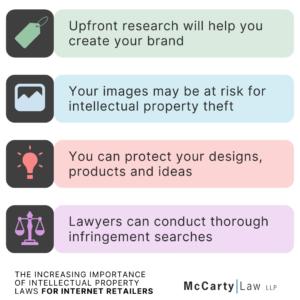How Internet Retailing is Increasing the Importance of Intellectual Property Laws
Your company identity is what sets you apart from others who do similar work, so crafting a creative name, logo, or even jingle is an essential step in establishing your success. Your brand needs to reflect your company’s uniqueness in order to leave a memorable impression but also lend you legal protection against other competitors doing similar things. In today’s competitive digital landscape, intellectual property theft can happen quickly and easily – and we’re seeing it affect more than just a company’s branding.
When creators post photos of their products on third-party retail websites, like Amazon or Etsy, people without honest intentions are saving these photos and promoting the products pictured as their own – often creating a much cheaper, lower-quality version of the original product. The problem is, in many of these online marketplaces, the seller does not have their intellectual property adequately protected via U.S. intellectual property laws, which can give businesses exclusive rights over what they create – including things like names, logos, designs, products, and ideas.
Sellers can plead their case to Amazon and Etsy, and other services like them, if they know their original creations have been misused. Unless sellers have proactively taken the necessary steps to protect their intellectual property, we’re finding that they’re often unsuccessful in getting these misrepresented photos permanently removed.
To make sure you don’t fall into this trap, follow these steps:
- Do some Googling. Does anyone else currently use a name or logo or have a product very similar to what you would like to use?
- Pay to make your creations your own. Intellectual property laws can only work well for you if you claim and protect your intellectual property. While there are some understood laws, the courts can work much faster and are more likely to give you a favorable outcome if you own the rights via paying for a patent, copyright or trademark registration for your intellectual property.
- Contact a lawyer. This is often a step that is overlooked, but it makes all the difference. A lawyer will conduct a thorough infringement search, looking in places you may not have already searched, to be sure there are no legal ramifications with the use of the name, logo or works you intend to use. When you’re looking for a lawyer, make sure they specialize in intellectual property law. McCarty Law has a great legal team who is well versed on these laws.
 There is no denying that when you make the choice to protect your intellectual property you are making an investment. But, by paying upfront for copyright, patent and/or trademark registrations you’ll be less likely to pay mounting legal fees later if you have to fight to protect your assets in court.
There is no denying that when you make the choice to protect your intellectual property you are making an investment. But, by paying upfront for copyright, patent and/or trademark registrations you’ll be less likely to pay mounting legal fees later if you have to fight to protect your assets in court.
McCarty Law understands the federal laws in place to protect intellectual property, including the growing list of nuances and concerns regarding internet stores. For a free 15-minute consultation to understand the right fit for your business and to learn more about how McCarty Law can help you protect your intellectual property, contact Kristy Christensen at (920) 257-2254 or [email protected]
Kristy A. Christensen
Latest posts by Kristy A. Christensen (see all)
- How Internet Retailing is Increasing the Importance of Intellectual Property Laws - February 15, 2023
- The Importance of Registering Your Trademarks - October 15, 2021
- Understanding the Copyright “Works Made for Hire” Rule - May 24, 2021
- The Importance of Trademark Infringement Searches - January 25, 2021
- What You Need To Know About Wisconsin’s Voting Laws Before November 3rd - October 12, 2020

